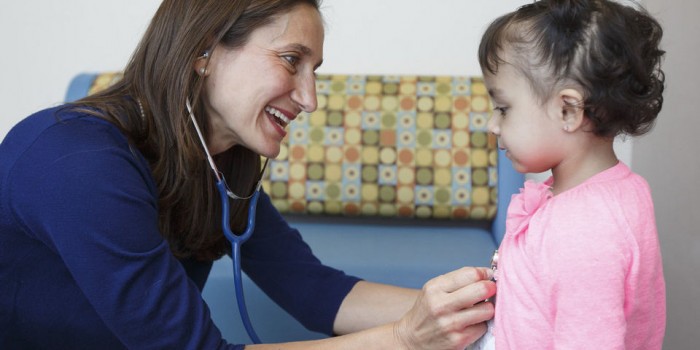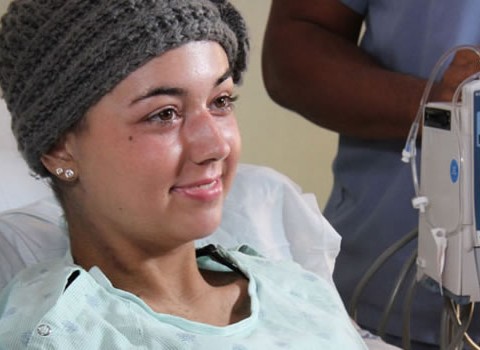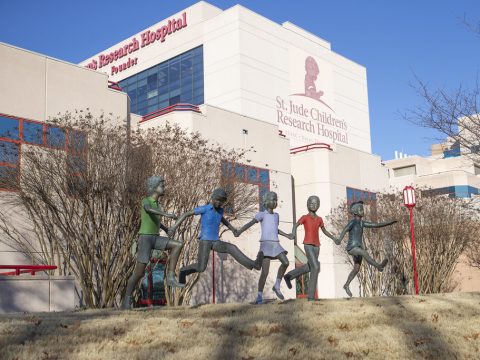
And their survival may hold the key to changing the trajectory of a deadly pediatric cancer.
The study published recently by Dr. Giselle Sholler shows promising results using a drug called DFMO to treat neuroblastoma, a cancer that strikes children and has a dismal long-term survival rate of 50 percent.
Sholler believes the drug targets an important cancer stem cell pathway, turning off the stem cells and preventing tumor growth.
“We are the first to say that and to show that in the lab,” she said.
The success with the phase 1 clinical trial has led to a second study that now involves 74 children nationwide, led by Sholler at Spectrum Health’s Helen DeVos Children’s Hospital. The preliminary results look promising.
That new study, a phase 2 clinical trial, tests whether DFMO can help children whose neuroblastoma is in remission. Even after aggressive therapy – which includes chemotherapy, radiation, antibody therapy and a bone marrow transplant – about 50 percent of the kids with neuroblastoma relapse. Thirty-five percent relapse in the first two years.
The children in the study take a DFMO pill twice day for two years. Of the 20 kids who have completed the program, 19 are still in remission.
Sholler cautioned that much follow-up still is required.
“It’s not statistically significant yet. We need to get all the patients enrolled and analyzed before we can say it is significant,” she said. “All we can say is it’s encouraging.”
But if they continue to see the same results, the survival rates for neuroblastoma could rival those for leukemia, considered a success in the treatment of childhood cancers.
“It’s mind-blowing,” said Patrick Lacey, whose 10-year-old son was part of the first clinical trial and is now living a healthy, active life. Lacey continues to be a major fundraiser for Sholler’s research. “This is a big milestone.”
The results of the phase 1 clinical trial are published in the May 27 edition of the journal PLOS One.
Although Sholler has moved into the phase 2 clinical trial, publishing the first study is a landmark moment because it lets the wider medical community know of the promising results and the science behind them.
“It’s great for the world to know kids with neuroblastoma have another option,” Sholler said. “No one has ever used DFMO with neuroblastoma before.”
The phase 1 study focuses on 18 children who have neuroblastoma, a cancer of the sympathetic nervous system that strikes when children are quite young. The average age at diagnosis is 18 months.
The drug investigated by Sholler — DFMO, or Difluoromethylornithine — has been used for decades to treat West African sleeping sickness, a disease that involves the same gene as neuroblastoma. The drug also is used in a cream to treat excessive facial hair in women.
A big advantage of the drug, in terms of cancer treatments, is that it has minimal side effects – in some cases, it causes thinning hair.
“These kids are running around. They are going to school,” Sholler said.
All the children in the study had relapsed or their disease was refractory – meaning it did not respond to treatments. Many of them had relapsed multiple times and had undergone other experimental therapies.
During the DFMO trial, six of the 18 children showed no progression of the neuroblastoma. Three have continued to thrive long after the study, even after stopping treatment.
Lacey’s son, Will, is one of those survivors.
Will was diagnosed at 6 months with neuroblastoma. Despite traditional and experimental treatments, the cancer continued to progress. When he was 2, his parents were advised to seek hospice care.
The Laceys, who live in Massachusetts, enrolled in Sholler’s clinical trial when she was at the University of Vermont. Will took DFMO for two and a half years. Eventually, PET scans showed the tumor in his chest had become inactive.
He ended treatment nearly three years ago. Since then, the tumor has shrunk 75 percent. Now, Will is an active, hockey-playing sixth grader.
Even while he was taking DFMO, Will lived a full and busy life, Lacey said.
“He did all these amazing things in school. He played all these sports. He had an amazing normal life,” he said. “That is what made me have this passion to make sure every kid with neuroblastoma has the opportunity to have access to that drug.”
Parents and doctors sharing the news
Word about the success with DFMO has spread, in part through strong parent networks.
On a recent morning at Helen DeVos Children’s Hospital, Sholler met with patients from Florida, Oregon and England.
Kian Musgrove, a 3-year-old boy from Newcastle, England, was at the hospital for his second visit. He came for a weeklong stay with his mother, Kat, and 5-year-old sister, Katie.
“Kian was finished with treatment in the U.K.,” Musgrove said. “I wanted to try other options to prevent it from coming back.”
A friend told her about a girl from Ireland, 6-year-old Lily Mae Morrison, who was enrolled in the DFMO clinical trial at Helen DeVos Children’s Hospital. Through a crowdfunding page, donors are contributing funds to help cover medical costs.
Rosalba and Javier Soto came from Orlando to enroll their 2-year-old daughter, Sophia, in the clinical trial. As Sophia went through treatment – and into remission – her parents heard about the study aimed at helping kids stay healthy.
“Everything that can help her stay in remission – I’m willing to try,” Rosalba Soto said. “I don’t want to hear relapse. I want her to be a survivor. I want her to be able to grow and to be a kid.”
Once Sophia is enrolled in the trial, she will be able to receive much of her care through a doctor close to home, who is involved in the research study.
Related: War on kids’ cancer goes global
The network of hospitals, universities and other institutions joining as partners in the research has grown from 15 to 24, Sholler said. Several more hospitals are planning to join.
While the phase 2 study focuses on children who are in remission, Sholler is leading other studies for other situations. One, involving children who have relapsed, involves genomic analysis of a child’s tumor to create a personalized treatment plan.
Long-term, Sholler hopes to see the cure rate for neuroblastoma improve. And eventually, she would like to find a way to make the standard treatment for the disease less toxic.
Getting the funding
Beat NB, the foundation Lacey created after his son was diagnosed, is working to keep the funds flowing to make that research possible. The foundation, with a donation from a Boston donor, created a million-dollar match campaign that raised more than $2 million in December 2014 for Sholler’s research.
Now, the foundation is aiming to raise another $10 million.
“The work that’s being done there is remarkable and life-altering, because Dr. Sholler has the freedom to focus on what is best for the patients,” Lacey said.
“We want to give her freedom to chase what’s best for patient and not chase the money. We don’t want her to slow down because money’s in the way.”
Sue Thoms covers health care for MLive/The Grand Rapids Press. Email her at sthoms1@mlive.com or follow her on Twitter, Facebook or Google+.



